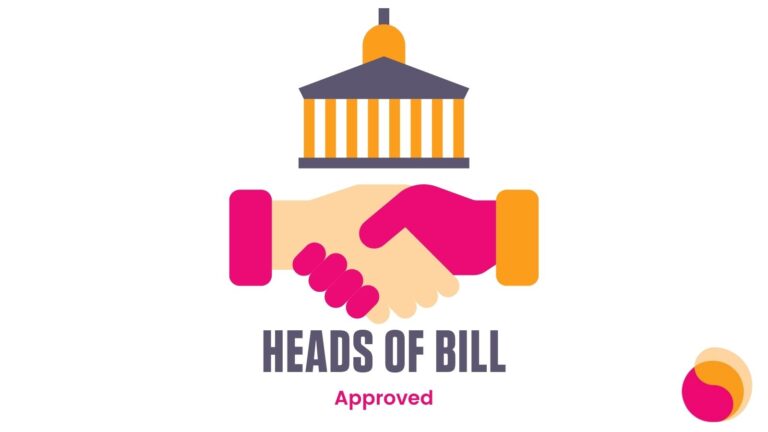
Reform the Mental Health Act

Why do we need to reform the Act?
People cannot wait any longer to have their rights protected.
The Mental Health Act, 2001 is outdated, it does not comply with international human rights standards, and does not adequately protect people’s rights.
That is why Mental Health Reform are campaigning for the full and urgent reform of the Mental Health Act, 2001.

Government approval of the heads of Bill
On 13th July 2021, Mental Health Reform welcomed the Government approval of the heads of Bill to amend the Mental Health Act. Mental Health Reform welcomes this important step taken by the Government to approve Ireland’s new mental health law. The decision represents a critical moment for the future of mental health services in Ireland.
You can read our full press release here.
What are the heads of Bill?
Before a Bill is finalised, a general scheme of the Bill may be published. This is often called the heads of Bill. The general scheme of a Government Bill undergoes scrutiny by an Oireachtas Committee before the text of the Bill is finalised. To find out more about how a Government Bill is passed, click here.
Heads of Bill for the Mental Health Act
The heads of Bill for the Mental Health Act are the result of extensive discussions between the Department of Health and key stakeholders over the last number of years. The heads of Bill contains over 120 proposed changes to the Act. These include guiding principles for adults and children into the Act, the voices of people using mental health services, and strengthened provisions for consent to treatment.
What happens next?
The heads of Bill will be published by the end of the month. It will be scrutinized by the Oireachtas through the Joint Oireachtas Committee on Health, who will make a report with recommendations. We in Mental Health Reform will also be reviewing the heads of Bill, providing opportunities for members and service users to provide feedback. We will continue to make Oireachtas members aware of the key issues that need to be addressed.
Keep an eye on our website, social media channels and newsletter to find out how to get involved
Public consultation
Earlier this year, the Department of Health lead a review of the Mental Health Act. As part of this review, the Department invited submissions from the public and key stakeholders. Information about the sections of the Act that the Department sought submissions on, can be found here.
Mental Health Reform hosted information sessions and created submission guidelines for the public in the run up to the public consultation. You can access our public information session, our submission guidelines, and read our full submission by clicking the buttons below.
What are some of the gaps in current legislation?
- Guiding Principles for Children: There are no specific guiding principles for children.
- Individual Care or Recovery Plans: There is no legal right to an individual care or recovery plan.
- Advocacy & Information: Voluntary patients do not have basic rights to information and advocacy.
- Capacity to Consent for 16 and 17 year olds:
- Young people aged 16 and 17 cannot consent to or refuse mental health care, but they can consent to or refuse physical health care.
- Advanced Healthcare Directives: Involuntary patients do not have the right to have their advance wishes about treatment respected.
What is needed?
- Full reform of the Mental Health Act, 2001
- Draft changes to the legislation to be published in full as soon as possible
- A clear timeline for when the new Bill will be published
A full outline of the need to Reform the Mental Health Act, 2001 is outlined in Mental Health Reform’s Briefing Note.
Click the button below to read the Briefing Note.
What has happened so far?
The Mental Health Act, 2001 was commenced in July, 2001.
The Mental Health Act, 2001 is the law in Ireland that must be followed when a person goes into hospital for mental health treatment.
These laws outline the process for people being admitted and treated in mental health services, and a person’s rights when admitted to a mental health service.
You can read the Mental Health Act (2001) in full here.
Mental Health Reform has advocated for the publication of the new legislation that will update the Mental Health Act in line with Expert Group recommendations.
The Expert Review Group made 165 recommendations that they felt were needed to update the Act.
Since the publication of their report, only 2 of the 165 changes recommended by the Expert Review Group has been made.
You can read Mental Health Reform’s analysis of the Expert Group Review’s Report here.
You can read the Expert Group Review of the Mental Health Act, 2001 Report here.
In 2016, we were successful in campaigning for the removal of the word ‘unwilling’ from Sections 59 and 60 of the Mental Health Act.
The removal of the word ‘unwilling’ meant that Electroconvulsive Therapy (ECT) and medication (administered for over three months) could only be administered to an involuntary patient without their consent, where it could been determined that the person is unable to consent to the treatment.
You can read that amendment to the Act here.
In 2018, Mental Health Reform supported a Bill by Fianna Fáil Spokesperson on Mental Health, James Browne, TD, entitled, the Mental Health (Amendment) Bill 2017.
The Bill sought to make certain small but very important changes to the Mental Health Act.
This included introducing a definition of a ‘voluntary patient’ to include only people who have capacity to make their own decisions (with support if required) and who do give their consent to admission to hospital. With the support of Mental Health Reform, our members and our supporters, this Bill was passed into law and became the Mental Health (Amendment) Act 2018.
This Act has not yet been commenced.
You can read Mental Health Reform’s analysis of the Mental Health (Amendment) Act 2018 here.
You can read the Mental Health (Amendment) Act 2018 here.
Get involved
- Send your submission to the Department of Health (click here)
- Share posts about the campaign to Reform the Mental Health Act on social media using #ReformMHAct

